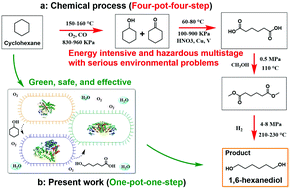One-pot biosynthesis of 1,6-hexanediol from cyclohexane by de novo designed cascade biocatalysis†
Abstract
1,6-Hexanediol (HDO) is an important precursor in the polymer industry. The current industrial route to produce HDO involves energy intensive and hazardous multistage (four-pot–four-step) chemical reactions using cyclohexane (CH) as the starting material, which leads to serious environmental problems. Here, we report the development of a biocatalytic cascade process for the biotransformation of CH to HDO under mild conditions in a one-pot–one-step manner. This cascade biocatalysis operates by using a microbial consortium composed of three E. coli cell modules, each containing the necessary enzymes. The cell modules with assigned functions were engineered in parallel, followed by combination to construct E. coli consortia for use in biotransformations. The engineered E. coli consortia, which contained the corresponding cell modules, efficiently converted not only CH or cyclohexanol to HDO, but also other cycloalkanes or cycloalkanols to related dihydric alcohols. In conclusion, the newly developed biocatalytic process provides a promising alternative to the current industrial process for manufacturing HDO and related dihydric alcohols.



 Please wait while we load your content...
Please wait while we load your content...